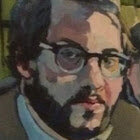I watched this film tonight. It reminds me simultaneously of Herzog’s Fitzcarraldo and Antonioni at his best. It is also the most compelling critique of the Western I have seen since Jarmusch’s Dead Man, and — as a feminist statement — a much needed addition to the canon of American historical films.
Kelly Reichardt is a true auteur and, I think, very important to the contemporary cinema. This film is an excellent example of the influence of 1970s art cinema on current movements in the indie world — especially in its hyperreal, philosophical, and patience-trying tendencies.* In Meek’s Cutoff, Reichardt is somehow able to retain the existential mood of Old Joy and Wendy and Lucy in a historically conscious film about 1840s frontiersmen. And the reverence for the long take doesn’t strike me as nostalgic or emphatic in the same way as it does within the whole Mumblecore scene and other “slow” cinemas. I, for one, find this to be quite impressive.
It is significant to add, I guess, that Bruce Greenwood is pretty great as the titular longhaired charlatan. I only wish I had seen this in a theatre.
*This, perhaps, is extremely obvious and goes without saying.











